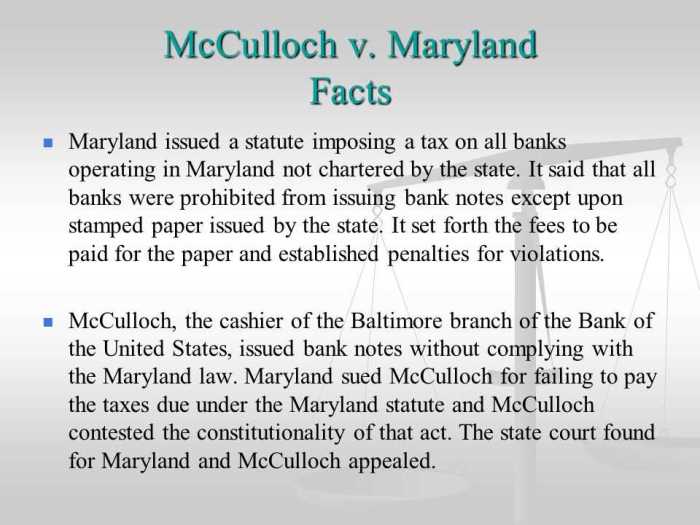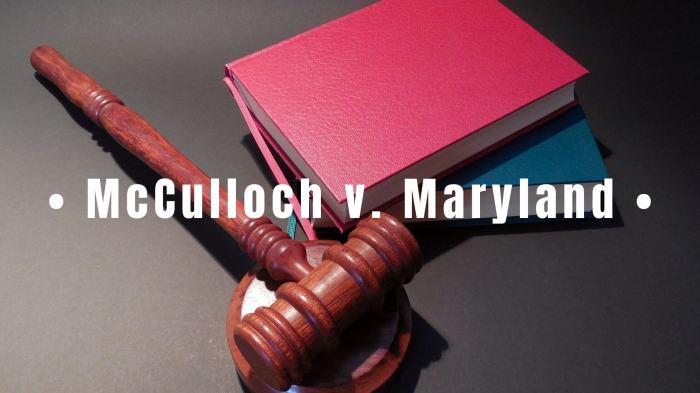Welcome to the icivics McCulloch v Maryland Answer Key, an authoritative guide to this pivotal Supreme Court case that established the principle of federal supremacy. Dive into the intricate legal arguments, explore the historical context, and unravel the lasting impact of this landmark decision.
McCulloch v Maryland challenged the limits of federal power and the relationship between the federal government and the states. As we delve into the details, we’ll examine the arguments presented by both sides and the Court’s reasoning in its groundbreaking majority opinion.
Introduction: Icivics Mcculloch V Maryland Answer Key

McCulloch v. Maryland (1819) stands as a pivotal Supreme Court case that solidified the supremacy of the federal government over the states. It centered on the constitutionality of the Second Bank of the United States, established by Congress in 1816.
Key Arguments
State of Maryland
- The federal government lacks the authority to establish a national bank.
- The Necessary and Proper Clause (Article I, Section 8, Clause 18) cannot be interpreted to justify such a measure.
- The bank’s operations infringe on state sovereignty and economic interests.
Federal Government, Icivics mcculloch v maryland answer key
- The Necessary and Proper Clause grants Congress implied powers to enact laws that are not explicitly stated in the Constitution.
- The bank is a necessary and proper means to implement the enumerated powers of the federal government, such as regulating commerce and borrowing money.
- The federal government’s authority to regulate currency and finance outweighs any potential state infringements.
Majority Opinion

Chief Justice John Marshall delivered the majority opinion, upholding the constitutionality of the Second Bank of the United States.
- The Necessary and Proper Clause provides Congress with implied powers beyond those explicitly enumerated in the Constitution.
- The bank is a necessary and proper means to carry out the government’s fiscal and regulatory functions.
- The federal government’s authority to regulate interstate commerce and currency supersedes state sovereignty in this case.
Dissenting Opinion

Justices William Johnson and Thomas Todd dissented, arguing that the bank’s establishment exceeded the constitutional authority of Congress.
- The Necessary and Proper Clause cannot be used to justify measures that are not clearly necessary.
- The bank is not essential to the government’s enumerated powers.
- The bank’s operations pose a threat to state sovereignty and economic stability.
Impact and Legacy
McCulloch v. Maryland had a profound impact on the balance of power between the federal government and the states:
- Established the principle of implied powers, expanding the scope of federal authority.
- Strengthened the federal government’s role in regulating the economy and finance.
- Set a precedent for the Supreme Court’s power to review and strike down state laws that conflict with federal law.
- Laid the foundation for the growth of federal power and the development of a national economy.
FAQ Explained
What was the primary issue in McCulloch v Maryland?
The case centered on the constitutionality of a state law taxing the Bank of the United States, which was established by Congress under the Necessary and Proper Clause.
How did the Court interpret the Necessary and Proper Clause?
The Court held that the clause grants Congress implied powers beyond those explicitly enumerated in the Constitution, as long as they are necessary and proper to carry out its delegated powers.
What was the significance of the McCulloch v Maryland decision?
The decision established the principle of federal supremacy, confirming that the federal government has the power to enact laws that are necessary to fulfill its constitutional responsibilities, even if those laws conflict with state laws.